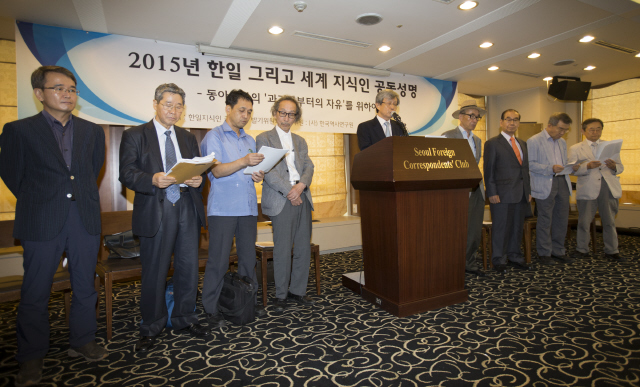 |
Seoul National University Professor Lee Tae-jin (center) announces a joint statement signed by more than 500 academics from South Korea, Japan, the US, and Europe calling for the resolution of conflict in Northeast Asia, at the Press Center in central Seoul, July 29. (by Kim Seong-gwang, staff photographer) |
Scholars argue that, “History is overcome through opening up, apologizing, and forgiving.”
More than 500 academics from South Korea, Japan, the US, and Europe released a joint statement calling for the resolution of conflict in Northeast Asia 70 years after South Korea was liberated from Japanese colonial rule and 50 years after South Korea and Japan signed a treaty normalizing their diplomatic relations. The statement, released five years after a similar statement, is called “2015 Joint Statement by Korean, Japanese and International Scholars for East Asia’s Freedom from the Past.”
In advance of the release of a statement by Japanese Prime Minister Shinzo Abe next month on the 70th anniversary of the end of World War II, these scholars said, “His statement must follow in the footsteps of the Kono Statement, the Murayama Statement, the Kan Statement, and other Japanese government history-related statements, not only reaffirming their understanding of history but also taking things one step further. Abe must furthermore admit that Japan’s history of colonization inflicted tremendous pain and damage to neighboring countries, while also expressing sincere regrets and apologies on behalf of Japanese people.”
The statement was released by the Promotional Committee for the Joint Statement by Korean and Japanese Intellectuals during a press conference held at the Press Center in Seoul on July 29.
“Conflicts based on past history can lead to clashing nationalisms, and if territorial disputes and security fears continue to escalate, democracy will retreat. Regression to the past can result in war, which reverses the course of history,” the intellectuals warned in the statement.
“We have to openly admit what happened in the past, apologize for it, and be pardoned in order to achieve reconciliation. We must free the present from the past. An East Asian ‘Freedom from the Past’ in which the future is unburdened by the history will open the door to a bright era of a Civil Asia.”
“Having achieved advanced industrialization based on market economics in the latter half of the 20th century, the region is now home to some 900 million people in the middle class and about 1.1 billion netizens connected by the Internet. These citizens must be free from distorted historical interpretations and from the propaganda churned out by hostile nationalism.”
A total of 524 scholars signed the statement: 382 from South Korea, including Kang Man-gil, professor emeritus at Korea University; Ko Un, poet; Baek Nak-cheon, professor emeritus at Seoul National University; Lee Man-yeol, professor emeritus at Sookmyung Women‘s University; and Lee Tae-jin, professor emeritus at Seoul National University); 105 from Japan, including Haruki Wada, professor emeritus at Tokyo University, and Aiko Utsumi, professor at Waseda University; 22 from the US, including Alexis Dudden, professor at the University of Connecticut; Bruce Cumings, professor at the University of Chicago; and Noam Chomsky, professor emeritus at the Massachusetts Institute of Technology; and 15 from Europe.
“In this statement, we wanted to reconfirm that Japan’s annexation of Korea was void ab initio, as we specified in the 2010 statement, while also showing just how foolish it is to suggest that we disregard the past and look to the figure,” said Kim Yeong-ho, former president of Yuhan University, who prepared the joint statement with Haruki Wada.
“There has been an extremely regrettable reversal on history in Japan since 2010, but even inside Japan criticism of Abe is increasing. Don’t give up hope about the situation in Japan,” Wada said.
On Wednesday, a demonstration also took place in Tokyo called “National Presentation of Civic Statements 70 Years after the War: Questioning Prime Minister Abe’s Understanding of History.” Participants in the demonstration called on Abe to include an apology and remorse for Japan’s wars of aggression and colonial rule in the new statement.
“Prime Minister Abe does not favor the idea of including an apology for colonial rule and wars of aggression in his statement. We call on Abe to offer a sincere apology and to provide compensation for the historical actions taken by Japan. We also think that Abe is responsible for transmitting this historical perspective to the younger generation.”
The participants published civic statements that had been posted all over Japan calling for the Abe statement to reflect a correct attitude about history. Japanese citizens have posted these statements in Tokyo, Hokkaido, Saitama, Toyama, Aichi, Osaka, Hiroshima, and other parts of Japan. The statements emphasize that, while Japan was a victim of the war, it must not deny its responsibility as an aggressor. On July 30, participants are planning to visit the Prime Minister’s residence and the Cabinet to deliver the statements published on Wednesday.
By Kim Kyu-nam, staff reporter and Gil Yun-hyung, Tokyo correspondent
english.hani.co.kr/arti/english_edition/e_international/702455.html




